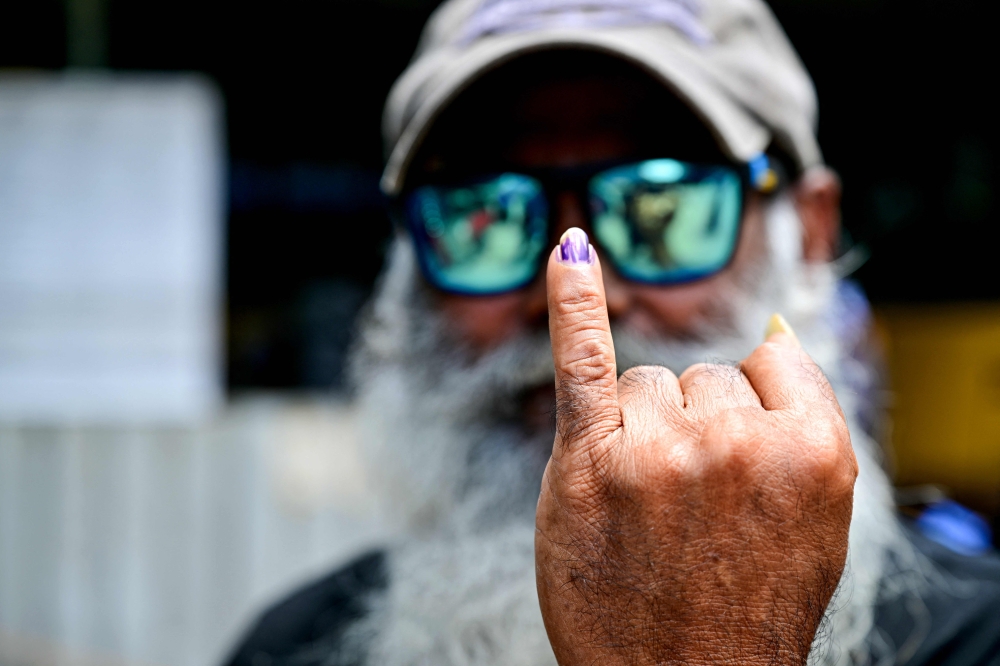

COLOMBO, Sept 21 — Cash-strapped Sri Lanka is voting for its next president today in an effective referendum on an unpopular International Monetary Fund austerity plan enacted after the island nation’s unprecedented financial crisis.
President Ranil Wickremesinghe is fighting an uphill battle for a fresh mandate to continue belt-tightening measures that stabilised the economy and ended months of food, fuel and medicine shortages.
His two years in office restored calm to the streets after civil unrest spurred by the downturn in 2022 saw thousands storm the compound of his predecessor, who promptly fled the country.
"I’ve taken this country out of bankruptcy,” Wickremesinghe, 75, said after casting his ballot in the morning.
"I will now deliver Sri Lanka a developed economy, developed social system and developed political system.”
But Wickremesinghe’s tax hikes and other measures, imposed per the terms of a $2.9 billion IMF bailout, have left millions struggling to make ends meet.
"The country has been through a lot,” lawyer and musician Soundarie David Rodrigo told AFP after casting her vote in Colombo.
"So I just don’t want to see another upheaval coming soon.”
Wickremesinghe is tipped to lose to one of two formidable challengers. One is Anura Kumara Dissanayaka, the leader of a once-marginal Marxist party tarnished by its violent past.
The party led two failed uprisings in the 1970s and 1980s that left more than 80,000 people dead, and it won less than four percent of the vote in the last parliamentary elections.
But Sri Lanka’s crisis has proven an opportunity for the 55-year-old Dissanayaka, who has seen a surge of support based on his pledge to change the island’s "corrupt” political culture.
At a polling station he said he was confident of securing the top job.
"After the victory there should be no clashes, no violence,” he said. "Our country needs a new political culture.”
Fellow opposition leader Sajith Premadasa, 57, the son of a former president assassinated in 1993 during the country’s decades-long civil war, is also expected to make a strong showing.
He vowed to fight endemic corruption, and both he and Dissanayaka have pledged to renegotiate the terms of the IMF rescue package.
"There is a significant number of voters trying to send a strong message... that they are very disappointed with the way this country has been governed,” Murtaza Jafferjee of think tank Advocata told AFP.
A total of 39 people are contesting the vote, including one 79-year-old candidate who remains on the ballot despite dying of a heart attack last month.
‘Wild elephants’
More than 17 million people are eligible to vote in the election, with more than 63,000 police deployed to guard polling booths and counting centres in schools, temples.
"We also have anti-riot squads on standby in case of any trouble, but so far everything is peaceful,” police spokesman Nihal Talduwa said.
"In some areas, we have had to deploy police to ensure polling booths are safe from wild animals, especially wild elephants.”
The government also banned the sale of liquor over the weekend and said no victory rallies or celebrations would be permitted until a week after the results were announced.
Polls close at 4pm (6.30pm Malaysian time), with counting to begin this evening.
A result is expected tomorrow, but an official outcome could be delayed if the contest is close.
Schools were closed yesterday to be converted into polling stations, which will be staffed by more than 200,000 public servants deployed to conduct the vote.
‘Not out of the woods’
Economic issues dominated the eight-week campaign, with public anger widespread over the hardships endured since the peak of the crisis two years ago.
Official data showed that Sri Lanka’s poverty rate doubled to 25 per cent between 2021 and 2022, adding more than 2.5 million people to those already living on less than US$3.65 (RM15.4) a day.
Experts warn that Sri Lanka’s economy is still vulnerable, with payments on the island’s US$46 billion foreign debt yet to resume since a 2022 government default.
The IMF said reforms enacted by Wickremesinghe’s government were beginning to pay off, with growth slowly returning.
"A lot of progress has been made,” the IMF’s Julie Kozack told reporters in Washington last week.
"But the country is not out of the woods yet.”
Voter Soundarie David Rodrigo agreed.
"We have a lot of challenges ahead so good luck to whoever comes,” she told AFP. — AFP pic
You May Also Like

